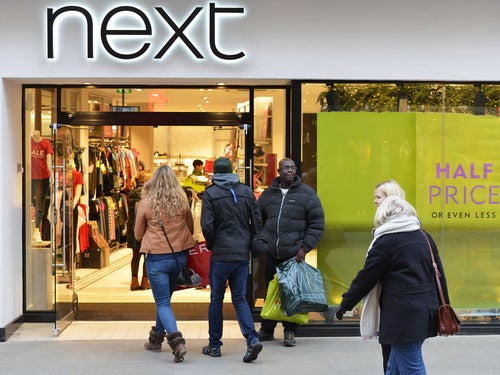
Next has reported better than anticipated sales for the nine weeks to 30 December 2022, prompting shares in the company to rise 9% in early morning trade, but the future looks bleak, says the retailer, issuing a cautious outlook which notes the cost price inflation on like-for-like goods to peak at around 8% in the spring/summer 2023 season and 6% in the second half of the year.
Next price increase for 2023 amid cost of living crisis
GlobalData’s apparel analyst, Emily Salter, tells Just Style: “Though this is a decent increase that will deter some consumers, increases are essential for Next to maintain its margins.”
She adds the retailer is expecting cost price inflation to ease in the second half, with increased operational costs driving this figure up. As a result, she says: “Next expects to increase its selling prices by 8% in spring/summer, and 6% in autumn/winter.”
Next reports positive Christmas period results
Next reveals full-price sales including interest income were up 4.8% against the same Christmas period in the previous year, which is around GBP66m (US$79.3m) above the previous guidance of -2% for the period.
The retailer says both online and retail exceeded its full-price sales expectations, with retail being particularly strong at +12.5% and online full-price sales for the period was up by 0.2%.
“We think that we underestimated the negative effect Covid was having on our retail sales last year. We may have also underestimated the effect improved stock levels would have on both businesses (stock levels were exceptionally low last year as a result of widespread supply chain disruption).”

US Tariffs are shifting - will you react or anticipate?
Don’t let policy changes catch you off guard. Stay proactive with real-time data and expert analysis.
By GlobalDataSalter believes this is also testament to the strength of Next’s proposition, both online and instore.
She explains: “Its significantly elevated stock levels can be seen in its sale stock, which was 31% higher on a three-year comparative, with it also starting its sale on Christmas Eve rather than the traditional Boxing Day – though this has clearly not hurt its bottom line.”
Next has increased its full-year profit before tax guidance by GBP20m to GBP860m, up +4.5% versus last year to reflect the better than-expected full price sales for the period, but says it remains cautious in its outlook for the year ahead, which Salter describes as an “enviable position”.
The initial guidance for the year ending January 2024 is for full-price sales to be down -1.5% and profit before tax to be GBP795m, down -7.6% versus the current year.
Next explains: “Forecasting for the year ahead at this early stage comes with a high level of uncertainty. We have assumed that full-price sales for the year ending January 2024 will be down -1.5% against the current year. Underlying product sales are expected to be down -2.2%. Interest income, from our consumer Finance business, is expected to contribute +0.7% growth to sales. This is mainly as a result of consumer balances continuing their return to pre-pandemic levels. Some might think this forecast is overly cautious in the context of our performance in the second half of this year.”
The retailer believes the following factors will dampen demand:
● Inflation in essential goods, particularly energy
● Rising mortgage costs as consumers’ fixed interest rate deals expire
● Continued price inflation in our own products
Next is quick to point out however, that it expects employment to remain strong so it is not anticipating a collapse in demand or any increase in bad debt over and above its current provisions.
Next heralded as bellwether for UK retail performance
Salter points out Next is often heralded as a bellwether for UK retail performance, and although its more positive results set a more optimistic tone for the performance of the sector over the golden quarter, many retailers will still have struggled, as Next’s proposition has allowed it to outperform since the outbreak of Covid.
Charlie Huggins, head of equities at Wealth Club agrees and states: “The group benefited from a cold snap in December, which has boosted demand for winter clothing, as well as the absence of pandemic restrictions, aiding store performance. Nevertheless, this shouldn’t take away from Next’s stellar execution. Many other retailers have struggled in the current environment, but Next’s proposition is clearly resonating with the UK consumer.”
Salter adds: “Next’s wide variety of brands allows shoppers to trade down within the retailer instead of switching to purchase elsewhere; and train strikes and snow dampened footfall in city centres in December, but Next will have benefitted from its presence across a range of locations, including retail parks. In this light, the retailer’s instore sales growth of 12.5% is impressive, though it will have gained from shoppers switching from purchasing online due to the postal strikes, with its online sales rising by 0.2%.”
A sober January predicted for Next ahead of price increase in spring/summer 2023
She suggests January will likely be a more sobering month for retailers, including Next as consumers cut back after the festive period, and this negative outlook holds for the rest of 2023 as consumers’ discretionary incomes are squeezed and they reduce their non-essential spending.
However, she says: “Next is in a good position to withstand this, and it expects its FY2023/24 full-price sales to only decline by a modest 1.5%, and profit before tax to fall by 7.6%.”
Salter concludes: “After having already purchased MADE and Joules in 2022, more opportunities to purchase distressed retailers will arise and Next will have the cash to do so, but it must ensure that it does not spread itself too thin and take on too much, reducing the chance of successfully reviving those it has recently acquired.”


